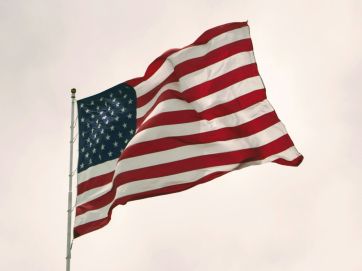On the last lap of the men’s freestyle swimming relay, the USA swimmer, Jason Lezak, surged from several strokes behind his next-lane-over rival. Rising out of the water with each superhuman stroke, Lezak eclipsed the French swimmer by .08 seconds, setting a world record and winning the gold medal for the USA. And oh the victory yells of Michael Phelps and the triumph of the four-man team! Oh the unbelievable race and the vindicated sensation of “we won”—especially in beating a team that had earlier promised to “smash” the Americans. All the glory of that moment suspended in its place in history was shared across the nation that night.
As I watched the roaring post-race glee on TV, strong were the cheers of Americans for their national representatives. Patriotism and pride welled, because “we won.” I then realized what makes the Olympics great and sets it apart from ordinary life. Besides being a worldwide event and providing the best coverage of out-of-the-way sports like synchronized diving, skeet-shooting, and pole vaulting, it comes down to three things:
In the Olympics, Americans show a loyalty to country, whereas otherwise we squint in distrust. The games are one of the only occasions in which the United States really does unite to rally as one nation. There, we cheer together for America. At a time when anti-Americanism has furrowed so many brows in suspicion and anger, it’s amazing that during these few days, we act as countrymen on the same side.
In the Olympics, we extol individual talent, whereas otherwise we cling to group preferences. Teams and individuals are evaluated on their performance, and the judges assign scores based on strict standards; there would be no integrity in winning medals without this objective judging system. If a gymnast falters, she loses points. That’s it. No one gives bonus points for diversity – that would instantly be recognized as bogus. The games are diverse, but not from quotas or gender balancing. True diversity happens on its own.
In the Olympics, we focus on what humans have in common worldwide, whereas otherwise we fix our attention on human differences. We are often told to embrace differences and celebrate diversity. It’s true that we can learn from one another because we are all different. But why aren’t we ever encouraged to learn from the things we have in common with other human beings? At the Olympics, we see a universal principle: that many countries love to play a large number of the same sports. Norway plays beach volleyball against Japan. Korea wrestles with Cuba. Countries around the world can compete together under international rules. In competition here there is a unity rarely acknowledged elsewhere.
The games provide a microcosmic context for the way the world could work. It is a truer framework, but one that we don’t apply to real life.
We need look no further than higher education to see the full picture. Colleges and universities cultivate anti-Americanism by teaching that America is an oppressive, racist, greedy society. They insult individual accomplishment by awarding preferences to certain identity groups. And they lose sight of common humanity by putting too much emphasis on social differences. Indeed, higher education trains students in these areas with almost the rigor and urgency of a swim coach. Academia beams with pride when graduates perform what’s been drilled into them.
But even as fads in higher education egg on political correctness, the Olympics run quite counter-culture. What does our altered behavior in that context evince? It seems that the way we conduct the Olympics reflects a glimmer of instinct—we possess an innate desire for shared love of country, for just standards, and for unity. Perhaps we instinctually understand that such conditions are necessary for fair dealings with the world. So why do we save them for the Olympics alone? Why not have more swimming relay victory moments?
We have settled into a pattern of suspicion, tolerance, and labels. Suspicion robs the joy of patriotism. Tolerance renders “good” and “excellent” meaningless. Labels fail to address the whole person. We’ve settled in this pattern, and it’s not likely that we’ll make the switch to the Olympic model anytime soon. The games will be over on August 24th. So better have a good hiding spot for your “Go USA” sign by then.













